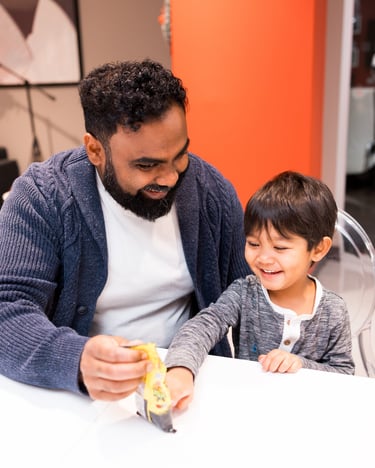Calling All Parents: Family Psychotherapy
The Impact of Parent Coaching: Supporting the Relationship with your Child, from Birth Through the Teenage Years
PSYCHOTHERAPY
Catherine Lau, M.ADS, RP, RBA(Ont), ATR
8/3/20245 min read










The Role of Parent Coaching in Early Childhood Development
My Baby and Me
The initial years of a child's life are pivotal, as 90% of brain development occurs before the age of five. During this period, the brain is most flexible and adaptable, making these early years critical for establishing a foundation for lifelong learning, behavior, and health. Understanding the importance of early childhood development underscores the value of parent coaching. Meeting with a psychotherapist can equip parents with essential strategies to enhance their child’s growth during these formative years.
Having someone to talk to who is trained in early childhood development can help you strengthen your bond with your growing baby. Psychotherapists can support you as you create and foster an enriching, nurturing environment, to help your baby grow and thrive. Approaches, such as responsive caregiving, where parents learn to read and respond to their child's cues effectively and practice "serve-and-return" interactions. The child's neural connections strengthen, which in tern support the development of the child's social skills and communication. A child psychotherapist can create an enriching therapy environment for you and your baby to play, bond, and connect. Responsive caregiving forms a secure attachment, reassuring children that their needs will be met, which is foundational for healthy emotional and social development. Similarly, reinforcing your baby's cues in these serve-and-return interactions can help parents provide feedback that significantly enhances language development.
"The most important influence on early brain development is the real-life serve and return interaction with caring adults"
Harvard University, Center on the Developing Child, 2024
A therapist can not only play with your child, but also facilitate play between you and your baby. It can be helpful to explore creative and enriching activities to support play and bonding with your child. Play is not merely an activity but a significant mode through which children learn about the world, themselves, develop cognitive and motor skills, and shape the brain's neural networks.
Consider booking a baby-and-me session with your baby and a child psychotherapist. The psychotherapist can offer techniques to help nurture a secure attachment with your baby, strengthen communication, and reinforce serve-and-return behaviours with your baby. This can support and foster your child's development, resilience, and milestone development. As infants become toddlers, and toddlers become young children, the secure attachments formed and the skills learned during early childhood set the stage for healthier development and a stronger parent-child relationship throughout the years.
Building a Foundation for Open Communication
My Tumultuous Toddler
"The terrible twos": along with the beauty of your child's budding independence, struggles with sleep, toileting, tantrums, meltdowns are common struggles that parents face (all amidst the judgement of the public eye). It can be confusing to be sure if we are really doing the right thing to support our child.
I find that parents often do not give toddlers enough credit for how much they really understand. Fostering a trust-based relationship and encouraging your child's problem-solving skills can be a tricky balance. We want to encourage our children to feel safe, understood, and supported, while setting appropriate parental boundaries. It can be helpful to have a therapist to talk to about your goals: to talk through any difficult situations or emotions around parenting, discuss approaches and perhaps develop a "game plan" on how to continue on your parenting journey.
A trained child psychotherapist can also offer psychoeducation and suggest strategies that can both support positive behaviour change in your child, strengthen your relationship with your child, and encourage their problem-solving and thinking skills.
A psychotherapist can also offer a safe space for your child to express themselves and share their experiences. Predictability in therapy strengthens trust, and may help a child feel more open to sharing personal issues. Allowing children to express their viewpoints and emotions without interruption or contradiction can help strengthen their self-esteem and confidence. This can be complemented by parents sharing appropriate levels of their own experiences and feelings, which can strengthen a toddler's understanding of emotions, and also bridge understanding and relatability between parent and child.
We are here to support you, ensuring that your toddler feels valued, respected, and heard.
Navigating the Teenage Years with Confidence
The teenage years present a unique set of challenges and opportunities for parents. As adolescents strive for independence and self-identity, parents may encounter increased complexity in addressing issues: peer pressure, academic stress, risky behaviors. Parent coaching with a trained child psychotherapist can offer parents space to clear their heads, guidance, and tools needed to navigate these turbulent years with confidence.
Parent coaching prepares caregivers to handle the multifaceted nature of teenage issues by emphasizing the importance of maintaining open and honest communication. The foundations of trust and openness established during the earlier years can significantly ease the tension and misunderstandings often associated with adolescence. Effective communication acts as a cornerstone, reinforcing a solid parent-teen relationship and making it easier for teens to discuss their struggles and seek advice.
Psychotherapists and parent coaches employ various strategies to help parents guide their teens through this critical period. One effective method is the use of active listening skills. This involves paying full attention to the teen's words, acknowledging their feelings, and providing empathetic responses. By practicing active listening, parents can foster a supportive environment where teens feel respected and heard.
Parenting is not supposed to be easy
Having a sounding board, someone to listen non-judgmentally, explore strategies and approaches that may work best for your child, and also hearing that you are in fact already using evidence-based strategies to support your child, can help you feel assured and confident on your parenting journey.
You are not alone.
Come together, come alone.
Here to support you, no judgement, wherever you are at.
Psychotherapy and Parent Coaching: supporting all parents, no judgement






Family Psychotherapy: connect with your family and strengthen relationships
My Baby and Me Psychotherapy: Play, communicate, strengthen secure attachment




